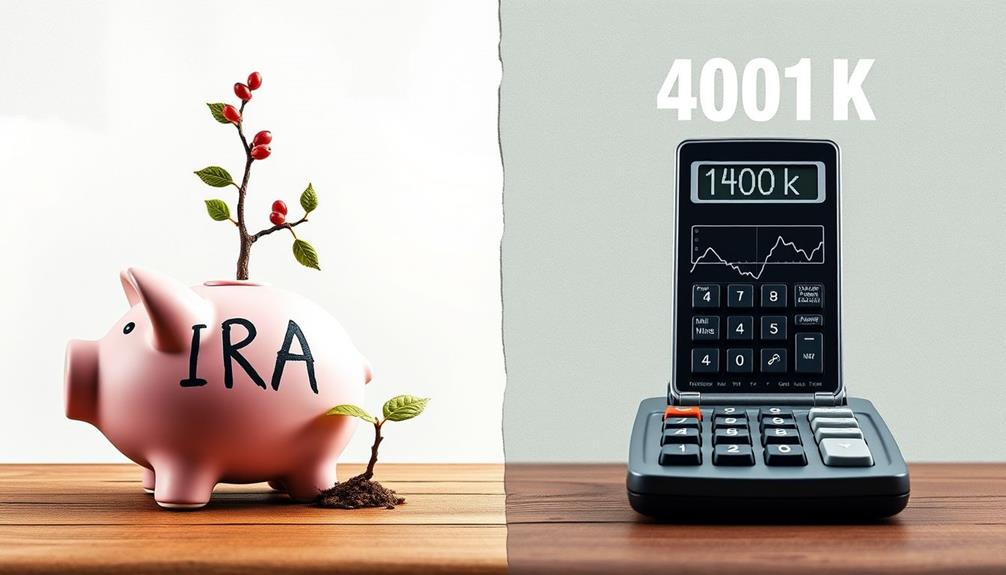To financially prepare for a recession, start by evaluating your financial situation—total income, expenses, debts, and savings. Build an emergency fund to cover 6-9 months of living expenses, ideally in a high-yield savings account. Manage and reduce debt by prioritizing high-interest obligations and consider debt consolidation. Create a flexible budget that allocates your income wisely, cutting nonessential expenses where you can. Stay informed about economic conditions and investment options to mitigate risks. Following these steps can help you navigate tough times more confidently, and there's more to explore on strengthening your financial resilience.
Key Takeaways
- Conduct a complete financial inventory of your income, expenses, debts, and savings to understand your current situation.
- Build an emergency fund that covers 6-9 months of living expenses using a high-yield savings account.
- Manage and reduce debt by prioritizing high-interest obligations and considering consolidation or refinancing options.
- Create a flexible budget by allocating 50% to essentials, 30% to wants, and 20% to savings, adjusting as necessary.
- Stay informed on economic indicators and explore diverse investment options to protect against market volatility.
Assess Your Financial Situation

Before diving into recession-proofing your finances, it's vital to take a good look at your current financial situation. Start by conducting a complete financial inventory. Calculate your total income, expenses, debts, and savings. With nearly 68% of Americans worrying about covering living expenses for a month without their primary income, understanding your financial foundation is significant.
Additionally, consider diversifying your investments to protect against market volatility; gold IRA rollovers can be a strategic move during uncertain economic times.
Next, assess your job security and industry stability. With projected job cuts of 252,000 by March 2023, knowing where you stand can help you prepare for potential changes. Evaluate your monthly bills and debt obligations, prioritizing necessary expenses.
Identify areas where you can cut back on nonessential spending to enhance your financial flexibility.
Don't forget to monitor your savings and investments. Nearly half of Americans reported decreased savings over the past year, highlighting the importance of building a saving habit.
Regularly review your financial situation against your budget goals to spot overspending and confirm you're ready for an economic downturn. By taking these steps, you'll be better equipped to navigate financial challenges that may arise during a recession.
Build an Emergency Fund

Building an emergency fund is one of the smartest financial moves you can make, especially in uncertain times. An ideal emergency fund should cover 6-9 months of living expenses to guarantee your financial security during job loss or economic downturns.
With 68% of Americans worried about covering expenses for just one month without income, it's vital to prioritize this savings. Additionally, understanding the potential impacts of credit card trends and e-commerce payment solutions can further inform your financial decisions during a recession credit card debt in the U.S..
To build your emergency fund effectively, consider these steps:
- Set a target: Aim for 6-9 months of living expenses.
- Start small: Establish a consistent savings habit, even if it's just a little each month.
- Use a high-yield savings account: Take advantage of interest rates (average 4.03%) to grow your cash.
- Automate your savings: Set up automatic transfers to make saving easier.
- Review regularly: Adjust your contributions based on your financial situation and goals.
Manage and Reduce Debt

Managing and reducing debt is essential during a recession, as high-interest obligations can quickly become overwhelming. With credit card rates hitting 20.22% in April 2023, prioritizing these payments is critical. Start by evaluating your debts and focusing on high-interest debt first, while making at least minimum payments on credit cards to maintain your credit score.
Consider consolidating or refinancing existing debts to lower rates, which can help ease financial strain during economic downturns. Not all debts require immediate payoff; for instance, mortgage and student loans often have lower rates.
Here's a simple table to help you manage your debts:
| Debt Type | Interest Rate | Action Plan |
|---|---|---|
| Credit Cards | 20.22% | Pay off first |
| Student Loans | 5% | Maintain payments |
| Mortgage | 3.5% | Refinance if possible |
Create a Flexible Budget

After tackling debt, creating a flexible budget is a smart next step to safeguard your finances during a recession. A flexible budget should allocate 50% of your income to essentials, 30% to wants, and 20% to savings. This structure allows you to adjust your budget based on changing circumstances and can help you prepare for potential market fluctuations, such as those experienced with high-risk investments.
Here are some strategies to help:
- Track spending: Use budgeting apps to monitor where your money goes.
- Cut costs: Identify nonessential expenses like dining out or entertainment and eliminate them.
- Create financial room: Reallocate savings from cut costs directly into your emergency fund.
- Adjust budget: Regularly review and modify your budget to reflect shifts in income or unexpected expenses.
- Build your emergency fund: Aim to cover 6-9 months of expenses to prepare for economic times.
Stay Informed and Educated

Staying informed and educated about the economy is essential for guiding through a recession effectively. By regularly monitoring economic indicators like GDP growth, unemployment rates, and inflation trends, you can stay informed about the likelihood of a recession and its potential impacts on your personal finances.
Consider exploring investment options such as precious metals, which can provide a hedge against economic downturns and inflation, as discussed in the Ultimate Gold IRA Rollover Guide. Utilize credible news sources and financial advisories to gain insights into expert forecasts and recommendations for navigating financial challenges.
Engaging in financial education is vital. Consider reading books, enrolling in online courses, or attending workshops to enhance your understanding of personal finance concepts. This will improve your money management skills and help you make informed decisions.
Additionally, keep an eye on changes in interest rates and credit conditions, as these can greatly affect your borrowing costs and savings strategies during a recession. Following reputable financial blogs or newsletters can provide actionable tips and updates on market trends, enabling you to adapt your financial strategies in response to current economic conditions.
Frequently Asked Questions
Should I Take My Money Out of the Bank Before a Recession?
You shouldn't rush to take your money out of the bank. Keeping it there can earn you interest and provide security. Instead, consider building an emergency fund for unexpected expenses during tough times.
How to Prepare for a Recession in 2024?
As storm clouds gather, you've gotta brace for impact. Start by building that emergency fund, tackling high-interest debts, and fine-tuning your budget. Stay informed, and you'll navigate the economic waves with confidence.
How Much Money Do I Need to Survive a Recession?
To survive a recession, you'll want to save enough to cover 3 to 6 months of living expenses. This buffer helps you manage unexpected financial challenges and maintain stability during difficult economic times.
How Does the Average Person Prepare for a Recession?
Imagine you're Sarah, cutting back on dining out to save for emergencies. To prepare for a recession, you prioritize essential expenses, build an emergency fund, and reduce discretionary spending, ensuring financial stability during uncertain times.
Conclusion
As you navigate the stormy seas of a potential recession, remember that preparation is your anchor. By evaluating your finances, building an emergency fund, managing debt, and creating a flexible budget, you'll be better equipped to weather any financial turbulence. Stay informed and educate yourself to adapt to changing circumstances. By taking these proactive steps, you're not just surviving; you're setting yourself up to thrive, no matter what economic waves come your way.










